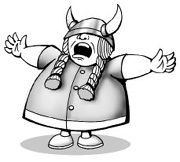Once again this year, I postponed dreaming up a Halloween costume until the last possible moment, when Champion Party & Costume ranked just below a leper colony on my list of places to visit. Then inspiration struck: I could dust off my tuxedo, borrow some opera glasses, tuck an Il Trovatore score under my arm, and go as an opera queen. I called a friend to share my plan.
“Buddy,” he protested, “the point of Halloween is to dress up as something you’re not.”
I was aghast. How could somebody close to me have arrived at such a preposterous conclusion? OK, maybe after having one too many I’ve been known to trot out the Maria Callas CDs. Perhaps I’ve made disparaging comments about Kathleen Battle now and again. But in the eight years I called New York home, I never once visited the Met.
Opera, like wine, is one of those topics where an individual can milk a lot of mileage out of a modicum of knowledge. It’s all relative. Plenty of people take a few semesters of high school Spanish yet would never dare to claim proficiency, but to someone who never studied a foreign language, even a few sputtered sentences might seem impressive.
Oddly, my opera background owes more to bullheaded obstinacy than any primordial attachment to the art itself. When applying to colleges, I auditioned for the voice department at a top music school. As an aspiring Broadway baby, their esteemed reputation was lost on me; I’d only applied because the college was my mother’s alma mater.
Somehow I slipped past the judges. I suspect a very talented tenor somewhere has wasted his gifts doing dinner theater because our applications got shuffled. Despite a command of Italian that wouldn’t cut it at the Olive Garden, I was assigned to the studio of a renowned baritone. The first time he told me I sounded like Tony Bennett—and how that wasn’t a good thing—I knew I wasn’t destined to be the next Domingo.
Yet pride refused to let me quit until I earned a degree. Everyone in the department knew I was a fraud, but I fancied myself the bad-boy mascot. I chain-smoked, showed up at rehearsals with tiger-striped hair, and only sang in master class when my teacher blocked the exits. I concentrated on neglected repertoire like Hanns Eisler’s lighthearted “On Suicide,” squeaking by as a Weill-crazed maverick in a pack of Verdi devotees.
My graduate recital involved mangling the high notes of a Rossini obscurity. But the faculty consented to pass me because they knew I had no intentions of singing opera ever again. They were correct. Regardless, after four years of constant exposure to Wagner, Puccini, et al., I emerged forever changed, and my admiration for the art’s practitioners remains unwavering.
Opera, like all forms of so-called “high” culture, exists on a plane where ridiculous demands are made of artist and audience alike. Navigating even the seemingly simplest aria can require a phenomenal degree of physical discipline, one often belied by the performers’ waistlines. But when all the elements come together in a great production, the effect is transcendental. And people need that fix. Because while pop or “low” culture helps us make sense of (or forget about) commonplace emotions and experiences, “high” culture at its best puts us in touch with the fantastic. It aspires to bring us closer to God (interpret that word as you wish).
Of course, when you circle too near the sun, there’s a distinct possibility of singeing one’s wings. I was reminded of that when a friend loaned me a copy of the film Opera Fanatic. In this 1996 documentary, countertenor Stefan Zucker travels through Italy with a film crew, interviewing great divas of yore to try to ascertain the essence of expressive singing.
In a series of episodes that rival This Is Spinal Tap in absurdity, Zucker asks white-haired women if mezzo-sopranos are more sexual than other types of singers, confessing to 66-year-old Leyla Gencer (who steals the movie) that he finds her melodramatic energy “erotic,” while in between interviews the divas engage in screaming matches and threaten to spank the narrator. What emerges is not a comprehensive study of expressive singing, but proof that devoting one’s life to the opera means residing in a histrionic world where the banal niceties of our normal existence do not apply. The lines between the singing heroines captured in the riveting 40-year-old film clips and the women who illuminated those characters disappear quickly.
You’ll find endless hilarity—and yes, inspiration—in this flick, even if you’ve never sat through one note of Don Giovanni. Then again, my judgment might be a little unsound. After all, I’m a tenor, and they say the higher a singer’s vocal register, the greater the amount of empty space nature allows in the skull to achieve proper resonance.
Opera Fanatic is available from Bel Canto Society, 11 Riverside Drive, Dept. ST, New York, NY 10023; phone 800-347-5056.






